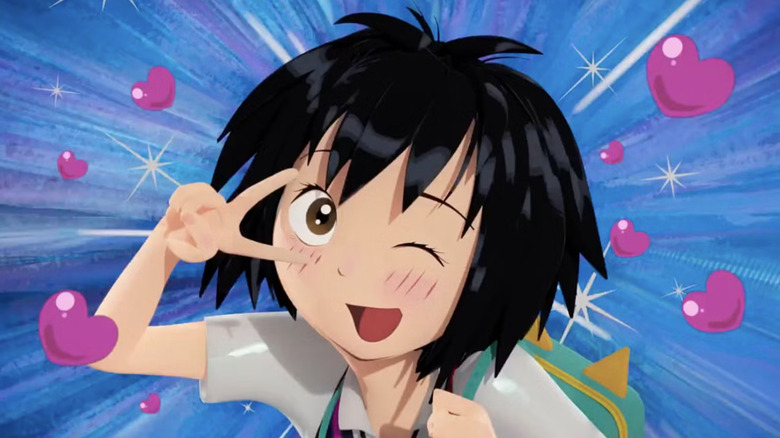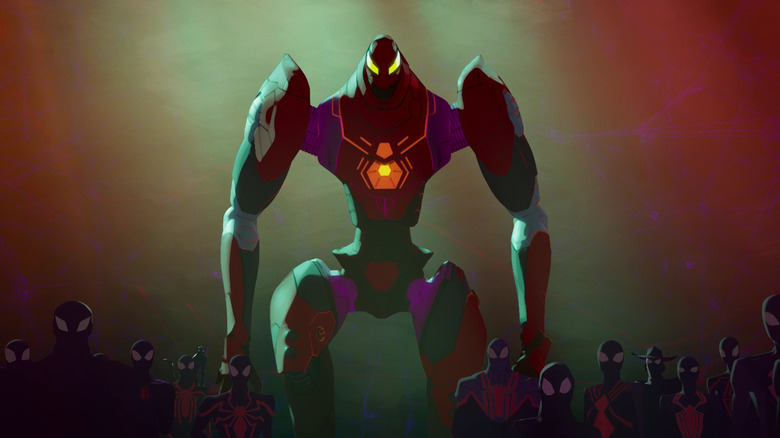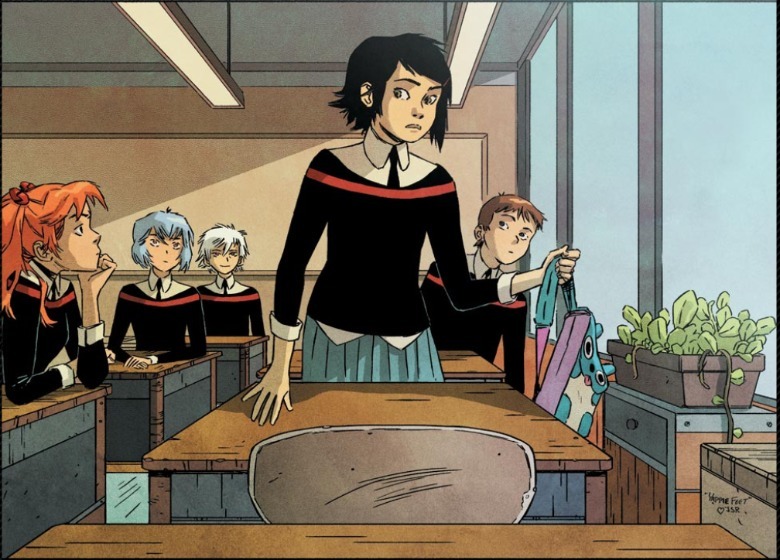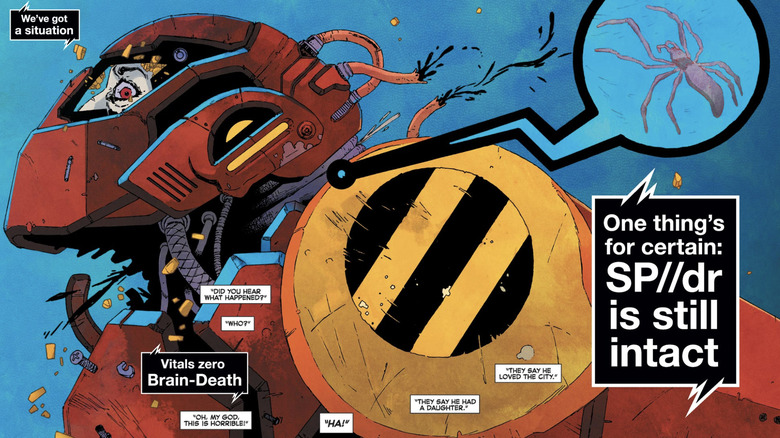Spider-Man: Into The Spider-Verse Has A Hidden Mecha Anime Reference
We may receive a commission on purchases made from links.
What elevates the "Spider-Verse" films above from other multiverse superhero movies is how they use the multiverse premise in formal ways; different universes have different animation styles and color palettes. One of the more offbeat Spider-People in "Spider-Man: Into The Spider-Verse" was Peni Parker (Kimiko Glenn), who hails from an anime universe. Rather than having spider powers of her own, Peni is a mecha pilot. Or rather, she has a psychic link with the spider that pilots the mecha (SP//dr) built by her late father.
For an anime novice (as I was when I first saw "Into The Spider-Verse"), Peni probably seems like a more generic anime homage. The psychic spider is just some typical anime weirdness, you think. But if you're more versed in Japanese animation, you'll realize Peni's backstory is specifically based on the famously surreal mecha series "Neon Genesis Evangelion."
Produced in 1995 and set in the then-future (2015), "Evangelion" follows teenagers who pilot Evangelion mecha units and battle monstrous kaiju called "Angels." There's even some thematic overlap with "Evangelion" and Spider-Man. Stan Lee and his artist collaborators' big innovation to superheroes was to make them rough around the edges and face real problems, and Spider-Man is the crowning example of that. Created to speak to the new teenage generation of the 1960s, Peter Parker had problems Superman never had to worry about: paying his sick aunt's hospital bills, keeping a girlfriend and a superheroic double life, etc.
All the way back to "Mobile Suit Gundam," mecha anime has explored the toil of war. "Evangelion" isn't too interested in politics, though; it's more psychological. It's all about exploring the toil that 14-year-olds, already desperate to prove themselves and not the most stable people, face in being forced into nightmarish conflicts. The series' primary creator, Hideaki Anno, was trying to work through his own depression and put facets of himself in all three of the EVA pilot characters: Rei Ayanami, Asuka Langley Soryu, and Shinji Ikari.
"Evangelion" ran for 26 episodes between 1995 to 1996, but after that the anime's story gets less linear. The story of "Evangelion" only truly ended in 2021 with the film "Evangelion 3.0 + 1.0: Thrice Upon A Time." In that time, "Evangelion" has become a merchandising and pop culture juggernaut, popular enough to influence an even bigger pop icon like Spider-Man.
Peni Parker mixes Spider-Man with Neon Genesis Evangelion
The influence of "Evangelion" on Peni Parker is more obvious in the comic where she first debuted: 2014's "Edge of Spider-Verse" #5. The big giveaway? During a scene depicting Peni in school, her classmates include Shinji, Asuka, Rei, and fellow "Evangelion" character Kaworu Nagisa.
Peni was created, and her debut made, by artist Jake Wyatt and writer Gerard Way. Yes, My Chemical Romance frontman Gerard Way, who has created other comics like "Umbrella Academy." Way is famously as passionate about comics as he is about music. He is also a manga nerd who is on record about his love for Katsuhiro Otomo's "Akira."
Based on "Edge of Spider-Verse" #5, he and Wyatt must be "EVA" nerds too. If there's any music that's perfect for "Evangelion" anime music videos (AMVs), it's My Chemical Romance. Throughout "Evangelion," Shinji often sits in silence, plugged into his headphones and listening to music on his SDAT player. He listens to the same songs over and over, reflecting a cycle of adolescent self-hatred he's caught in during "Evangelion." The audience doesn't hear the music, so feel free to imagine that Shinji is playing "The Black Parade" on repeat.
Speaking to Rolling Stone in 2014, Way discussed designing Peni and playing around with Spider-Man:
"I just took the basic concepts of Spider-Man and then I looked deeper into it. I thought about the radioactive spider: 'What if it was more than just a bite? What if a bite was a psychic link and the spider stayed part of the story?' That brought up a little girl who loses her dad. Then I drew the spider suit."
In the comics, SP//dr looks just like an EVA unit in red and gold: slim build, shoulder fins, spindly limbs, but with Spider-Man-like yellow pointed eyes on its heads. The mech is also only slightly taller than a person, rather than skyscraper-sized like the Evangelions. "Into the Spider-Verse" changes the design, giving SP//dr an egg-shaped torso with a screen face, which dilutes the "Evangelion" homage. Then it comes roaring back in "Across the Spider-Verse," where the rebuilt SP//dr (see above) now looks just like the comic one.
Neon Genesis Evangelion took mecha for a Freudian spin
The Evangelions aren't mere robots; the Units are all clones of one of the first two Angels, Adam and Lilith. Their mechanical outer appearance is armor meant to both protect and restrain them. As they're like the Angels, EVA Units can project protective A.T. (Absolute Terror) Fields and tear through the Angels' Fields. That's why they're the only weapons that can defeat the Angels.
Why can only teens pilot these weapons? EVA Unit-01 contains the soul of Shinji's mother, Yui Ikari, just like Unit-02 contains Asuka's mother's soul. (Rei's case is more complicated but I won't spoil it.) That connection is needed for the interface; the EVA pilots are essentially retreating back into their mothers' wombs when they pilot. In "The End of Evangelion," Asuka is inspired to keep fighting when she realizes her mother has been watching and protecting her the whole time.
That extra layer to the mecha-pilot relationship is also present between Peni and SP//dr. The robot was built by Peni's father, like how Shinji's father Gendo oversaw the EVAs' creation. She can only pilot it, though, because of her connection with the spider, like how Unit-01 will only accept Shinji because Yui recognizes him.
The big difference is the pilots' attitudes. Shinji piloting Unit-01 was a burden he accepted out of guilt and a resolve not to run away from the world. Peni, though, embraces SP//dr and her psychic spider pal as her best friends. Where Shinji is sullen, Peni is as perky as a Spider-Woman can be.
"Spider-Man: Beyond the Spider-Verse" is scheduled for theatrical release on June 25, 2027.



